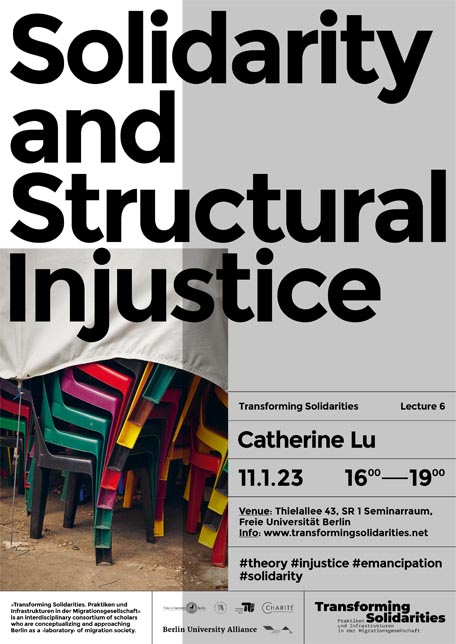TRANSFORMING SOLIDARITIES LECTURE SERIES
Wednesday, 11.01.2023, 4-7 pm | Institute for Philosophy, Thielallee 43, Seminar Room 1, FU Berlin
Solidarity and Structural Injustice - Catherine Lu
Why does solidarity in practice buttress social justice claims in some contexts, while stymying such efforts in others? In contexts of structural injustice, associational life will be distorted or corrupted in ways that also undermine both, the instrumental and non-instrumental value of solidarity as a social practice. Thus, while valuable to some, solidarity will precisely fail where structural injustice is deep and pervasive enough to sever the bonds of identification that are needed to ground solidarity as an emancipatory social practice. Normatively, the value of solidarity as a social practice is based not only on the worthiness of an association’s ends, but also on its contribution to the perpetuation or dismantling of structural injustice. In this light, calls for solidarity can themselves be constitutive of social structural justice, and lack of solidarity by the privileged with the oppressed can itself be morally objectionable or blameworthy. This is because lack of solidarity with the oppressed may be based on a moral failure to acknowledge the oppressed as agents who have interests in and entitlements to equal freedom, dignity and/or respect. In such cases, even if members of a privileged group share in solidaristic associational life towards a good end, the noninstrumental value of such solidarity is necessarily limited, and even questionable. Ultimately, one may be more ambivalent about the instrumental or noninstrumental value of solidarity as a social practice in contexts of deep and pervasive structural injustice.

Catherine Lu is Professor of Political Science at McGill University, and Director of the Yan P. Lin Centre for the Study of Freedom and Global Orders in the Ancient and Modern Worlds, as well as Research Coordinator of the Research Group on Global Justice of the Lin Centre. Her research interests intersect political theory and international relations, focusing on critical, historical, and normative studies of global justice, structural injustice, and colonial international order; humanitarianism and intervention in world politics; alienation and reconciliation; and cosmopolitanism and the world state. In addition to writing articles on these themes, she is the author of two books: Justice and Reconciliation in World Politics(Cambridge University Press, 2017), which won four book awards, and Just and Unjust Interventions in World Politics: Public and Private (Palgrave Macmillan, 2006).
Transforming Solidarities. Praktiken und Infrastrukturen in der Migrationsgesellschaft« is an interdisciplinary consortium of scholars who are conceptualizing and approaching Berlin as a ›laboratory‹ of migration society – that is, a society that is fundamentally and irrevocably transformed by migration. Through case studies that examine the interconnected areas of labor, housing and health we explore how solidarity is negotiated and investigate practices and infrastructures that condition or limit solidarity.
More info: www.transformingsolidarities.net
Download Poster here.
Foto: (c) Monika Keiler